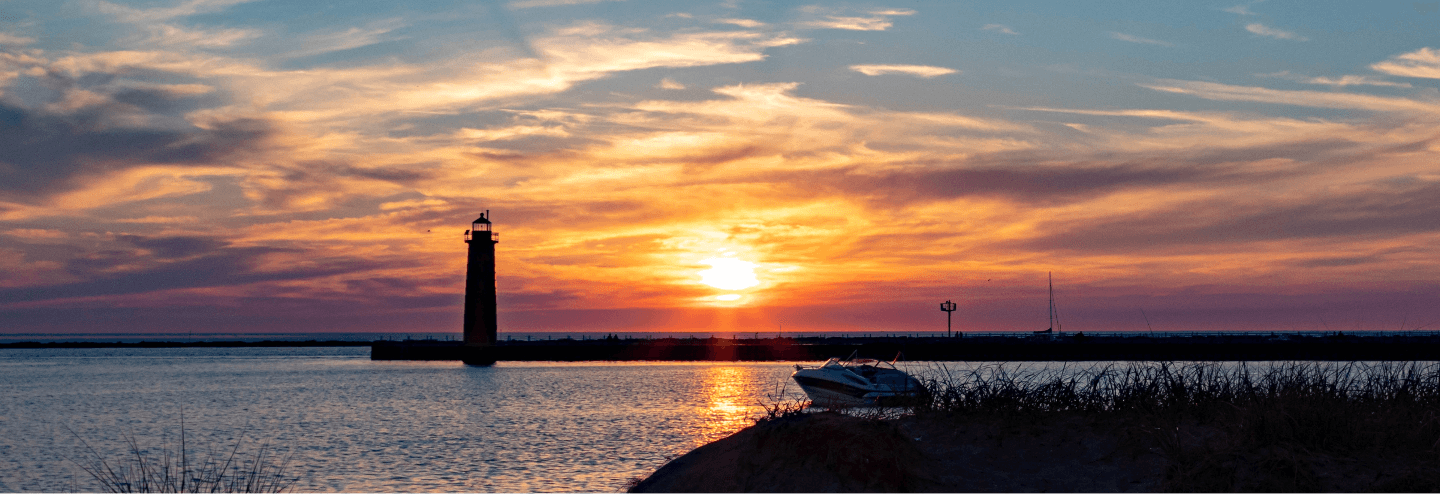MCC Science Center
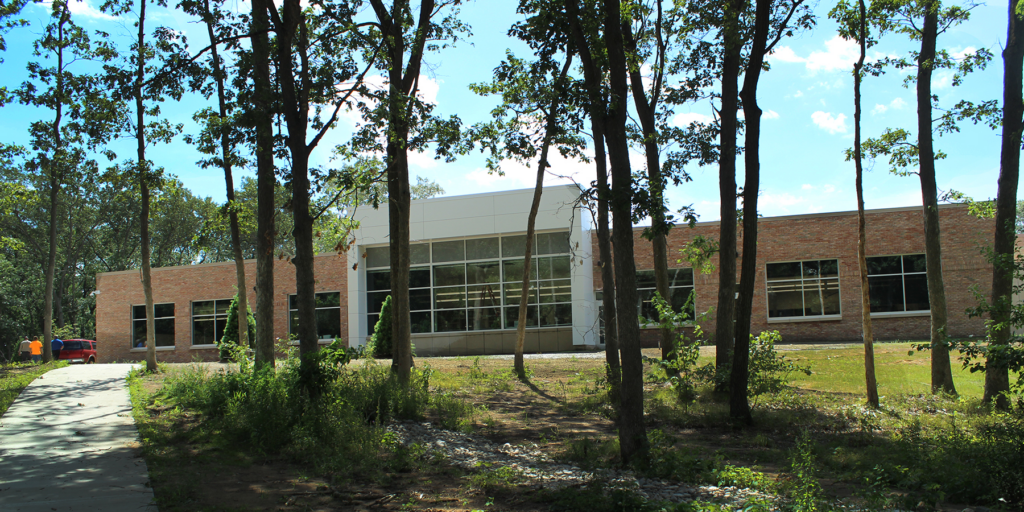
The MCC Science Center opened in Fall 2015.
Welcome to the Science Center, home to the MCC Life Sciences Department and the College’s biology courses. The $9.6 million facility was completed in August 2015. The MCC main campus was designed in the 1960s by famous architect Alden Dow, known for incorporating buildings into rolling, natural landscapes. The new Science Center was sited and designed to blend in with the original buildings and minimally disturb the site. The exterior landscape provides habitat for vegetation and wildlife, along with preventing water erosion and discharge of storm water.

In April 2016, the MCC Science Center earned the Leadership in Energy and Environmental Design (LEED) Gold Certification for its sustainable strategies used in its design and construction. The Science Center is only one of four buildings in Muskegon to have received this high honor.
LEED Certification
The Science Center was built using the USGBC LEED Building Design and Construction Version 3 Rating System to document the sustainable strategies used during the design and construction of the new science center. LEED features employed in the Science Center construction included: landscaping with proper storm water drainage; the use of light colored, heat-reducing colors on sidewalks and roofs; air quality control,; use of low volatile organic compounds; water efficient plumbing; individualized lighting controls, use of recycled construction materials; recycling of construction waste; and implementation of recycling containers.
Atrium
As you enter the Science Center from the Stevenson Center, you traverse a long hallway that leads to the Atrium, where an abundance of natural light filters into the space through many windows. Overhead, works of art by Michigan artist Pi Benio hang from the ceiling. From this point, visitors are at a hallway that runs left and right is lined with lockers for student use.
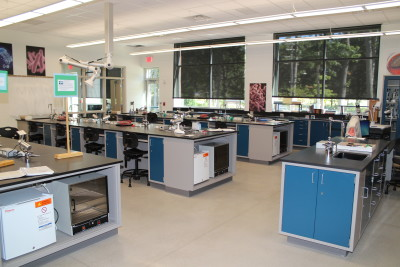
MCC Science Center Microbiology Lab
General Biology Lab (Room 1417)
Biology 110 is an introductory course that is a study of local natural communities and human impacts on the environment. Through service learning, students will apply the scientific process by collecting, analyzing, and then presenting local ecosystem data to the community. This class features field trips throughout Muskegon County that include a boat trip, brownfield tour, and building tour featuring renewable energy.
Herbarium/Prep Room (Room 1415)
The Herbarium is home to a collection of sheets that showcase some of the native plants to our campus, as well throughout Michigan. This room also is used to store equipment used in the field during student labs. The Muskegon Community College Herbarium has specimens dating from 1894 to the present day with a total of 1676 specimens. Collectors included Cal Scott from West Bend, Wisconsin in 1974; MCC student Kathy Anderson in 1968; Reverend Clinton Frank of Hope College in 1917, and MCC student Engelien de Bruin in 1987, who now teaches in the Netherlands. Read more about other MCC Herbarium collectors.
General Biology Lab (Room 1413)
This lab will provide students the chance to explore the diversity, classification, ecology, and evolution of the natural world and the importance of photosynthesis and other cellular processes. Different types of organisms, such as bacteria, protists, fungi, plants and animals, will be studied to compare structure and function. Biology 104 includes several field trips and a committee/council meeting from environmental groups around Muskegon. In addition to this course, Biology 120: Flowering Plants of West Michigan and Biology 200: Introductory Evolution are offered.
Grow Room (Room 1413A)
The Grow Room will allow students to grow plants for use in lab and provide them with a chance to see them from seed to plant. This area can also be used for Aquaponics. The hope is to have a continuous system that will run from semester to semester.
Microbiology Lab (Room 1412)
This lab provides students with hands-on microbiology application. Students who take the advanced course are typically pursuing careers in nursing, respiratory therapy, pre-med, med tech, sports science, and veterinary medicine. Weekly labs provide current insights into microbes in the environment and the human body. The lab is equipped with many features for specifically working with microbes. Some of the latest additions include biological safety cabinets for working with pathogens, microscope cameras and integrated computer systems for better visualization of the tiny microbes, and a much improved work space for lab and research projects. Labs incorporate many of the latest in biochemical, immunological, and genetic techniques.
Research Area (Room 1414A)
This section of the Undergraduate Research Area will be used by the Microbiology students for their special project. This area features a stand-alone incubator that will allow students to house their projects as well as laboratory experiments, and a -40°C freezer to store specimens and DNA for extended periods of time.
Prep Area (Room 1414)
The Prep Area is home to the behind-the-scenes work of the lab. Media used in Microbiology, reagents, solutions and other necessary items are prepped here for the labs. New to the Science Center are a dishwasher, a Smart2Pure water system, and a scientific grade refrigerator. These items will allow labs to be ready for students and easy for instructors to conduct their labs.
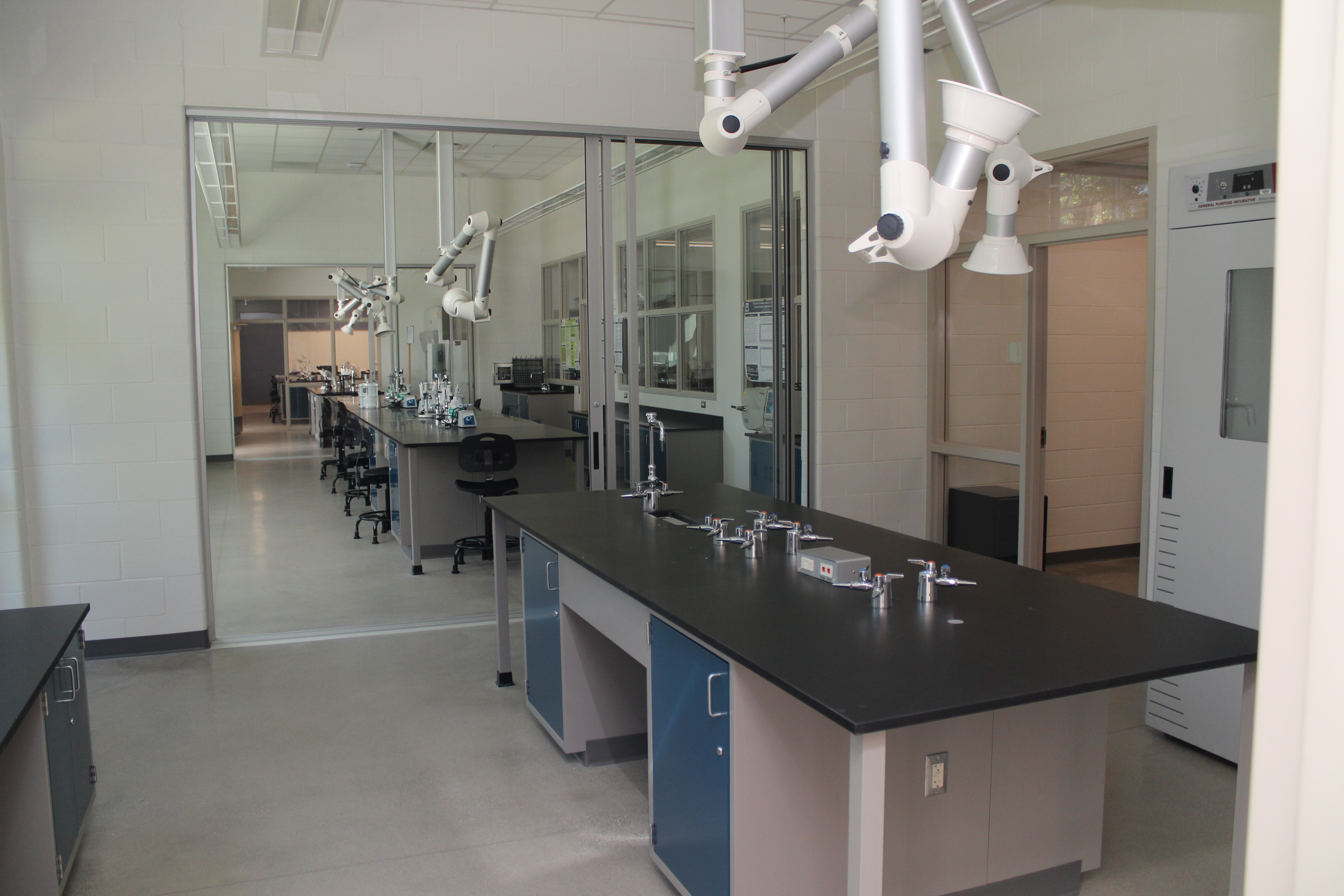
MCC Science Center Undergraduate Research Labs
Undergraduate Research Area (Room 1416A)
Biology 297 students conduct actual research here with faculty guidance and present their findings to their peers and at symposiums in Michigan and through the national Community College Undergraduate Research Initiative Program. The students begin the course with an in-depth look at how to use a variety of equipment. Following this, students are encouraged to find a topic that interests them and employ the scientific method to conduct a research project.
Research Area (Room 1418A)
This is another extension of the Undergraduate Research Area. This specific section is being used for DNA/RNA research. Technology here includes electrophoresis, which allows a researcher to see the bands of DNA to be used for identification. The overhead hood here differs from the other portable hoods found in the Science Center labs. This hood is used for preparation of samples in a clean area, one free from contamination.
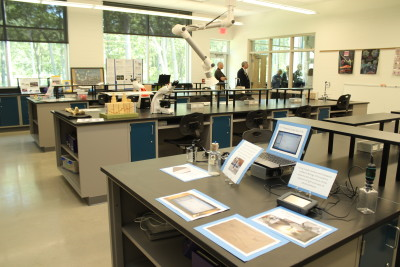
MCC Science Center General Biology Lab
General Biology Lab (Room 1420)
Welcome to Biology 103, which is an introductory biology course that focuses on the study of life, on chemistry related to the body, on the building blocks of our body (carbohydrates, lipids, proteins, nucleic acids, ATP), and on cellular processes like metabolism, human body systems, development, and genetics. Students are introduced to cellular structure and function, cellular processes, human body systems and how they relate to their lives, heredity, and genetic processes. These labs utilize hands on experiments, dissections, and incorporate technology for students to understand how they are relevant to them.
Anatomy and Physiology Lab (Room 1423)
This lab is one of our two Anatomy and Physiology Labs in the new building. This lab is home to Biology 105. In addition to studying gross anatomy – what can be seen with the naked eye – students also learn what tissues look like when using a microscope, e.g. histology. During labs, students will utilize the models, microscopes and other on-line resources to experience and learn anatomy and physiology. Labs include the use of hundreds of realistic models, microscopes, online resources, dissections, and practicals. All labs are equipped with three sinks – two that are very wide and deep that allow for the washing of dissection equipment, as well as one ADA sink. These sinks are extremely helpful in dissection labs due to the size of the trays that students use.
Biology Lab (Room 1419)
This lab is used by our Biology 106 students. The course focuses on the physiological components of the body systems. This builds on the foundation of Biology 105 and goes into depth of more the function and why than the structures. Study of the human body is the cornerstone for students pursuing careers in nursing, respiratory therapy, pre-med, pharmacy, physician assistant, and other high demand health related fields. This lab utilizes the iWox system to explore the function of muscles, cardiac output and respiration.
Storage Room (Room 1419A)
The room, adjacent to the two anatomy and physiology labs, is used for storage space.
Prep Area (Room 1421)
This prep area is home to our dissection equipment. New to our department is the washing center for buckets and large equipment.
Student Resource Room (Room 1416)
This room is designed with the student in mind. In here, students have access to models, textbooks, computers, microscopes and other reference materials provided by the instructors. Students are welcome to come into this room throughout the day to study, review and work with our tutors. There are times for walk-in tutoring that any student can attend and get help in their courses. Students will have the opportunity to use the projector system to practice presentations, show other students their work or watch the latest online talk by a leader in their field.
Life Science Secretary Office (1411)
The Life Sciences Department secretary’s office is located here.
Lab Coordination Office (1418)
The Life Sciences Department lab coordinator’s office is located here.
MCC Science Center Ribbon Cutting



What is the Historical Information about Herbarium Collectors?
The Muskegon Community College Herbarium has specimens dating from 1894 to the present day with a total of 1676 specimens. Collectors included Cal Scott from West Bend, Wisconsin in 1974; MCC student Kathy Anderson in 1968; Reverend Clinton Frank of Hope College in 1917, and MCC student Engelien de Bruin in 1987, who now teaches in the Netherlands. Other major collectors were the following:
- Eric A. Bourdo, Jr (1917-1995) collected most of his specimens in 1974. After completing his degrees from Michigan Technological University, and the University of Michigan (PhD in forestry), Eric worked as a consultant for many wood product companies, as well as being a professor at Ford Forestry Center (1958-1981) and Michigan Technology University 1947-1958. He authored many articles and a guidebook on trees.
- Hazel Roach Delcourt attended MCC in 1968-1969 and then graduated from Albion College in 1972. She later completed a Master’s degree in botany from Louisiana State University (1974) and earned her PhD in ecology from the University of Minnesota (1978). Hazel also served as secretary of the Ecological Society of America from 1986-1992 and retired as a full professor from University of Tennessee in Knoxville. She and her husband wrote many articles and books on forestry, ecology, and paleoecology.
- Mary Kasey Hartz (1908 – 2001) taught in MCC’s Life Sciences Department from 1958-1973. She and her students established the campus’ natural area and trails in the 1970s. In 2003, new trail boardwalks were constructed from funds bequeathed by her. Kasey was dearly loved by many people who enjoyed her as a trail guide not only here but also at Hoffmaster State Park. She graduated from College of St. Teresa in Winona, Minnesota in 1929. Teaching at a variety of different high schools, junior schools, and colleges, she completed her Master’s degree from the University of Minnesota in 1952 with a focus in aquatic ecology. A book of her poetry was published by Jim and Jane Kane in 2001 (Kasey Hartz: Poetry and Biography. Muskegon Community College).
- The D. McLouth specimens range from 1890s – early1900s. Many of these fragile herbarium sheets are annotated and noted by Dr. Edward Voss, (deceased) curator of University of Michigan Herbarium for the 1966 Michigan Flora Project. Clarence D. McLouth (1860-1932) was a science teacher, head of the Muskegon High School’s Natural Science department, and contributed to the Michigan Flora prepared by W. J. Beal in 1904. Clarence was instrumental in establishing the “Garden Boys” in Muskegon around 1914. Young students were given a small parcel of garden to plant and maintain on the outskirts of Muskegon Heights. Garden yields were eaten or sold. Some of his contemporaries wrote this about Clarence: “He is a widely recognized authority on all of the native flora and bird life, and gives his boys much valuable information about insects and plant life. He teaches them to enjoy, protect, and preserve both the wild flowers and all bird life in any form.” Collins & McMillan. 1915. Kalamazoo Normal Record (1910-1918). Western Michigan University.
- Roy Struven (1925-1999) was the planetarium technician and taught Celestial Navigation, Electronic Math, and Acclimatization Workshop at Muskegon Community College during 1975- 1988. He collected many plant specimens during his tenure.
- Theresa Van Veelen, with field assistance from MCC student Barbara Grob, collected over 500 plant specimens for the herbarium and course materials during her first sabbatical in 2010. Theresa graduated from Grand Valley State University in 1993, with a biology degree and an emphasis in botany and later completed a Master’s degree in Zoology from Michigan State University in 1999. She has been teaching full time in MCC’s Life Sciences Department since 1999. During the Fall 2016, she categorized and imaged all herbarium sheets for digital viewing on the Consortium of Midwest Herbaria


